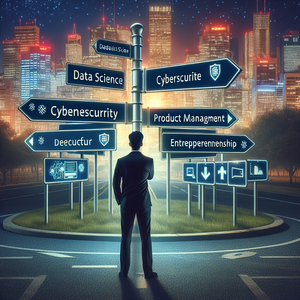The Last Generation of Coders: How AI Could Redefine Software Development

The rise of AI in software development has been swift and groundbreaking. Tools like GitHub Copilot, OpenAI’s Codex, and DeepCode are already demonstrating how AI can revolutionize coding. These systems, trained on vast repositories of existing code, can analyze natural language inputs to generate entire functions, suggest optimizations, and even identify bugs. For example, GitHub Copilot uses AI to autocomplete code snippets and recommend solutions, reducing the time developers spend on tedious or repetitive tasks. But these tools are just the beginning. The long-term vision for AI in software development goes beyond assistance. Researchers and organizations are working on AI systems capable of independently creating software from scratch. Imagine a business owner describing their needs—“I need a mobile app that tracks employee productivity and integrates with our existing systems”—and an AI system delivering a fully functional application within minutes. Such advancements have the potential to fundamentally change the nature of coding. Instead of writing code line by line, developers could take on a more abstract role, focusing on articulating goals and constraints while the AI handles the execution. This paradigm shift could render traditional coding skills less essential, replacing them with a need for expertise in managing and guiding AI systems.
From Coders to AI Managers
As AI takes over the mechanics of writing code, the role of software developers is set to evolve. In this new landscape, developers may no longer be defined by their ability to write efficient algorithms or debug complex systems. Instead, they could become managers and curators of AI systems, ensuring that the software generated by these systems is accurate, functional, and aligned with organizational goals. For instance, a developer overseeing an AI-driven project might not write a single line of code. Instead, they would guide the AI by providing clear instructions, reviewing its outputs, and addressing any shortcomings. This requires a new set of skills, including knowledge of machine learning, data science, and AI ethics. Developers would need to understand how to train and refine AI systems, ensuring they produce reliable and unbiased results. This shift isn’t unprecedented. Similar changes have occurred in other industries. In manufacturing, for example, automation and robotics have transformed the role of workers. Instead of manually assembling products, workers now operate, monitor, and maintain robotic systems. Likewise, in software development, coders could transition from creators to supervisors, taking on responsibilities that prioritize oversight, strategy, and innovation.
Challenges and Concerns
While the potential benefits of AI in software development are significant, they come with challenges that cannot be ignored. Chief among these is the potential for job displacement. If AI systems can handle the bulk of coding tasks, what will happen to the millions of software developers around the world? Entry-level programmers, in particular, may find it increasingly difficult to break into the industry, as the demand for traditional coding skills diminishes. Moreover, the reliance on AI-generated software raises questions about reliability and accountability. AI systems, while powerful, are not infallible. They can produce code that is technically correct but flawed in practice, failing to account for factors like user experience, accessibility, or security vulnerabilities. Without skilled human oversight, these issues could compromise the quality of software and even lead to harmful outcomes. Ethical concerns also loom large. AI systems are only as good as the data they are trained on, and biases in training datasets can lead to biased algorithms. For example, an AI system might inadvertently generate code that discriminates against certain user groups or fails to comply with privacy regulations. Developers will need to ensure that these systems adhere to ethical standards, a responsibility that requires both technical expertise and a deep understanding of societal impacts. Finally, the widespread adoption of AI in software development could exacerbate existing inequalities in the tech industry. Large corporations with the resources to develop and deploy advanced AI systems could dominate the market, leaving smaller companies and independent developers struggling to compete. This concentration of power could stifle innovation and limit opportunities for those without access to cutting-edge tools.
Opportunities in a Changing Landscape
Despite these challenges, the rise of AI in software development also presents exciting opportunities. By automating routine tasks, AI tools can free up developers to focus on more creative, strategic, and high-value work. Developers could spend more time designing user-centric systems, solving complex problems, and exploring new technological frontiers. In this sense, AI could serve as an enabler, amplifying human creativity rather than replacing it. AI-powered tools also have the potential to democratize software development. As these tools become more sophisticated and accessible, individuals without formal coding backgrounds could use them to create their own applications. This could lower the barriers to entry for tech innovation, empowering a more diverse range of people to participate in shaping the digital world. For example, a small business owner with no coding experience could use an AI tool to build a custom e-commerce platform, leveling the playing field between large corporations and independent entrepreneurs. Additionally, the integration of AI into software development could lead to the emergence of new roles and career paths. Future developers might specialize in training AI systems, auditing their outputs for quality and fairness, or developing ethical guidelines for their use. These roles could attract a broader range of talent to the industry, fostering a more inclusive and multidimensional workforce.
The notion that we are witnessing the last generation of coders may seem dramatic, but it captures the transformative moment we are living through. The rise of AI in software development signals not the end of coding but the evolution of the profession. As AI systems become more capable, the role of the human developer will shift from writing code to managing, guiding, and collaborating with intelligent systems. This transition will bring challenges, including job displacement, ethical dilemmas, and the risk of concentrating power in the hands of a few. Yet it also holds immense potential to enhance creativity, democratize innovation, and redefine what it means to be a software developer. In the end, the advent of AI in software development is not a story of obsolescence but one of reinvention. Just as previous technological advancements have transformed industries without erasing them, AI will redefine the world of coding, opening new doors even as it closes others. And as we navigate this new chapter, one thing remains certain: the human capacity for adaptation and innovation will continue to shape the future of technology.
AI-Powered Software Development Specialist
Microsoft, GitHub, OpenAI, and startups developing AI coding tools
Responsibilities
Collaborate with AI systems to design, test, and deploy software with minimal manual coding.
Evaluate AI-generated code for functionality, performance, and alignment with project goals.
Provide feedback to improve AI tools, ensuring outputs meet high-quality standards.
Required Skills
Proficiency in at least one programming language (e.g., Python, JavaScript) and familiarity with AI coding assistants like GitHub Copilot.
Background in software development combined with knowledge of machine learning principles.
Strong debugging and analytical skills to review and refine AI-generated solutions.
AI Model Trainer for Software Development Tools
OpenAI, Google DeepMind, AWS, and research labs in tech companies
Responsibilities
Curate and preprocess massive datasets of code to train AI models for software development.
Fine-tune pretrained models to handle domain-specific tasks (e.g., cybersecurity-focused coding).
Collaborate with software engineers to integrate models into workflows.
Required Skills
Expertise in machine learning frameworks (e.g., TensorFlow, PyTorch) and coding libraries.
Deep knowledge of programming paradigms, software patterns, and version control systems like Git.
Experience in evaluating model outputs for bias, accuracy, and security vulnerabilities.
Ethical AI Auditor for Software Development
IBM, Accenture, Deloitte, and organizations focusing on AI ethics
Responsibilities
Analyze AI-generated code for compliance with ethical standards, privacy laws, and regulatory frameworks.
Identify and mitigate biases in AI systems trained on code repositories.
Develop and enforce governance policies for AI use in software development.
Required Skills
Knowledge of ethical AI principles, data privacy regulations (e.g., GDPR, CCPA), and secure coding practices.
Familiarity with AI audit tools and methodologies for assessing algorithmic fairness and transparency.
Strong communication skills to collaborate with cross-functional teams in legal, engineering, and policy.
AI Integration Architect for Development Workflows
Amazon, Salesforce, IBM, and enterprise SaaS providers
Responsibilities
Design and implement systems that seamlessly integrate AI coding tools into existing development pipelines.
Assess the impact of AI on team workflows and optimize processes for efficiency and collaboration.
Ensure AI-generated outputs align with CI/CD (Continuous Integration/Continuous Deployment) practices.
Required Skills
Strong background in DevOps, cloud computing, and software engineering.
Experience with AI/ML frameworks and tools like Kubernetes, Docker, and Jenkins.
Ability to bridge the gap between AI teams and development teams, ensuring smooth adoption of AI tools.
Human-AI Collaboration Designer
Adobe, GitHub, Atlassian, and design-focused AI startups
Responsibilities
Develop strategies and tools for effective collaboration between human developers and AI systems.
Focus on user experience (UX) design for AI-powered development tools, ensuring accessibility and ease of use.
Conduct research to understand how developers interact with AI and optimize workflows accordingly.
Required Skills
Expertise in UX/UI design, especially for technical audiences and software tools.
Familiarity with programming and AI tools to understand user needs and design intuitive interfaces.
Strong skills in usability testing and data-driven design iteration.


